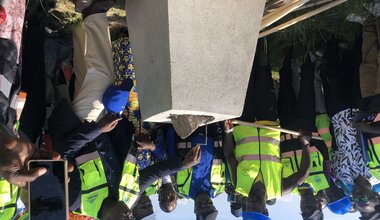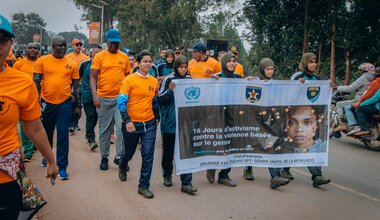UN panel urges support for sexual violence victims in DR Congo
Kinshasa/Geneva, 13 October 2010 – A high-level panel convened by the UN High Commissioner for Human Rights to hear directly from victims of sexual violence in the DRC reported Wednesday on its preliminary findings that the needs of the victims are largely unmet, particularly in remote areas.
The panel, which held interactive dialogues with survivors and other stakeholders in six towns in three different provinces, had been tasked by the High Commissioner for Human Rights to consider and discuss the adequacy of remedies and reparations available to victims of sexual violence.
Chaired by Ms. Kyung-wha Kang, the Deputy High Commissioner for Human Rights, the panel included Ms. Elisabeth Rehn, former Minister of Defense of Finland and currently Chair of the Board of Directors of the ICC's Trust Fund for Victims, and Dr. Denis Mukwege, Medical Director of Panzi Hospital in Bukavu (South Kivu). The panel worked in consultation with the Ministry of Justice and Human Rights, and the Ministry of Gender, Family and Children.
From 30 September to 10 October, the panel travelled to Bukavu, Shabunda (South Kivu), Bunia, Komanda (Orientale), Mbandaka and Songo Mboyo (Equateur), meeting a total of 61 victims, ranging in age from three years old to sixty-one years old, and including four male victims. In each place, the panel met with provincial and local government officials, and convened roundtables with officials in the justice sector, members of civil society and UN representatives. The meetings were organized with the support of Panzi Hospital and the Joint Human Rights Office/MONUSCO. In Bukavu, the panel was joined by the Secretary-General's Special Representative on Sexual Violence in Armed Conflict, Margot Wallstrom, and the Deputy Special Representative in the DRC, Leila Zerrougi.
On 12 October, the panel shared its preliminary findings with government officials, civil society, and UN representatives at a forum in Kinshasa.
"As we heard again and again, there is a deep need and a clear call from victims for much more assistance and reparation," said Deputy High Commissioner for Human Rights, Kyung-wha Kang. "The lives they knew have been largely destroyed, and they are suffering greatly – physically, psychologically and materially."
This victimization is compounded by the stigma they often face in families and communities, she said. "Their husbands desert them, they are socially ostracized, and often this rejection is compounded for victims who suffer from fistula, victims who become pregnant and bear children as a result of rape, or victims who contract sexually transmitted diseases, including HIV/AIDS."
The panel noted that public recognition of the harm and public support for victims, particularly at the highest levels of government, would go a long way to help change the culture that currently puts the shame on the victims rather than the perpetrators of sexual violence.
While the panel noted there are some programs directly supporting victims of sexual violence, Kang said, "the tremendous needs of the victims are largely unmet, particularly in remote areas." Health care and education for their children and themselves were among the highest priorities conveyed repeatedly to the panel by the victims. In the Kivus, where armed conflict continues, the victims' first and foremost concern was for peace and security. As they told the panel, without peace and security the restoration of everything that had been lost would have no meaning as it could be lost again at any time. "The women made it clear to us that the destruction must stop before any rebuilding can begin," said Kang. "And the panel is adding its own voice to this desperate plea for peace and security."
The fight against impunity and access to justice were also among the issues raised by the victims and other relevant actors. Most of the victims were not in a position to seek justice through the legal system as they could not identify or locate their perpetrators. The panel noted the call around the country, from victims and others, for a new mechanism that would give these women access to reparations.
The panel noted that there could be many forms of reparation to fit the varying needs of victims. "We met one woman who was infected with HIV/AIDS as a result of rape and unknowingly infected her husband," Kang said. "When he died, his family threw her and her children out of her own home. For this woman, a house where she and her children can live in peace is what she needs most to begin to rebuild her life."
In Songo Mboyo, where the women victimized by a mass rape attack in 2003 have formed an association of survivors, the panel, with the support of UNIFEM, was able to contribute a much needed boat to the association, to assist them in the safe transport of their goods down river to the market.
For the victims who were able to identify their perpetrators and had the courage to bring cases in court, and to secure convictions and damage awards, this success has been hollow as they have seen their perpetrators escape from jail and they have not received any payment to date on the indemnities awarded to them. "The panel found that the failure to pay these awards is further undermining the judiciary system and the confidence of victims in the ability of the state to deliver justice," Kang said.
The panel met with a number of male victims of sexual violence, who suffer an additional layer of stigmatization because of their gender. The panel also met with a number of victims raped by civilians and noted the high incidence of rape since the war, which created an environment in which "rape is committed routinely with impunity."
The panel will prepare a report with a set of recommendations for the High Commissioner for Human Rights to present to the Government of the DRC and other stakeholders. These recommendations are intended to complement ongoing efforts to promote justice by providing assistance and support to victims, and to help advance programmatic activities relating to the implementation of the national strategy on sexual violence with regard to reparations.
 UN
UN United Nations Peacekeeping
United Nations Peacekeeping






